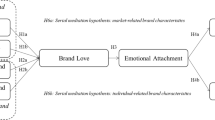Abstract
Brand loyalty has been at the heart of marketing strategy as one of the key factors that drive revenues and success of a brand. Consumers’ emotional connection with a brand is considered key to assess strength of loyalty for long-term sustainability of a brand. Affective certainty toward a brand as a result of brand experience can lead to brand loyalty. This paper investigates influence of emotional confidence and brand association on brand loyalty. Further, it investigates whether there is statistically significant difference between consumers having low emotional confidence and those showing high emotional confidence in terms of their brand loyalty.
Data was collected outside fast-food restaurants across Karachi, using systematic sampling. Every fourth person exiting the restaurant was approached to fill a questionnaire (n = 252). The data was analyzed using structural equation modeling. The results suggest that both brand association (β = .72 P < .001) and emotional confidence (β = .19 P < .001) have statistically significant influence on brand loyalty. The variance explained in brand loyalty was higher when emotional confidence was included in the model. Independent-samples test suggests statistically significant difference (t (250) = −6.99, P < .001) between consumers having low emotional confidence and those having high emotional confidence in terms of their brand loyalty. Consumers with higher emotional confidence showed higher brand loyalty.
You have full access to this open access chapter, Download conference paper PDF
Similar content being viewed by others
Brand loyalty has been at the heart of marketing strategy as one of the key factors that drive revenues and success of a brand. Consumers’ emotional connection with a brand is considered key to assess strength of loyalty for long-term sustainability of a brand. Affective certainty toward a brand as a result of brand experience can lead to brand loyalty. This paper investigates influence of emotional confidence and brand association on brand loyalty. Further, it investigates whether there is statistically significant difference between consumers having low emotional confidence and those showing high emotional confidence in terms of their brand loyalty.
Data was collected outside fast-food restaurants across Karachi, using systematic sampling. Every fourth person exiting the restaurant was approached to fill a questionnaire (n = 252). The data was analyzed using structural equation modeling. The results suggest that both brand association (β = .72 P < .001) and emotional confidence (β = .19 P < .001) have statistically significant influence on brand loyalty. The variance explained in brand loyalty was higher when emotional confidence was included in the model. Independent-samples test suggests statistically significant difference (t (250) = −6.99, P < .001) between consumers having low emotional confidence and those having high emotional confidence in terms of their brand loyalty. Consumers with higher emotional confidence showed higher brand loyalty.
Author information
Authors and Affiliations
Corresponding author
Editor information
Editors and Affiliations
Rights and permissions
Copyright information
© 2018 Academy of Marketing Science
About this paper
Cite this paper
Rizvi, W.H., Rashid, A.G., Amir, H. (2018). Brand Association and Emotional Confidence: Determinants of Brand Loyalty: An Abstract. In: Krey, N., Rossi, P. (eds) Boundary Blurred: A Seamless Customer Experience in Virtual and Real Spaces. AMSAC 2018. Developments in Marketing Science: Proceedings of the Academy of Marketing Science. Springer, Cham. https://doi.org/10.1007/978-3-319-99181-8_6
Download citation
DOI: https://doi.org/10.1007/978-3-319-99181-8_6
Published:
Publisher Name: Springer, Cham
Print ISBN: 978-3-319-99180-1
Online ISBN: 978-3-319-99181-8
eBook Packages: Business and ManagementBusiness and Management (R0)




